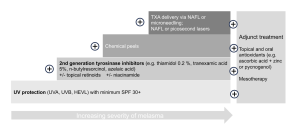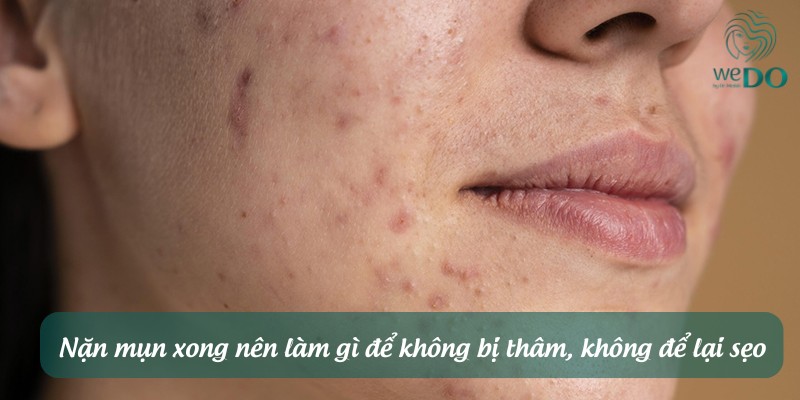Effective Melasma Treatment at WEDO Skin Clinic: Your Comprehensive Guide
Jawline acne comes in various types and severity levels, depending on the skin condition. It is estimated that over 50% of women aged 20-29 experience this issue. So, what causes hormonal acne on the jawline? How can it be treated? Are there preventive measures? All will be answered in the following article. What Are the
Cách chăm sóc da sau khi mới nặn mụn đóng một vai trò rất lớn đến việc hồi phục sự mịn màng của làn da về sau. Bởi vì nếu da được chăm sóc cẩn thận thì sẽ tránh tối đa nguy cơ hình thành vết thâm và sẹo trên làn da. Vậy nặn mụn
CONTENT
Melasma is a common and challenging skin condition that causes dark, discolored patches on the face, primarily affecting areas exposed to the sun. This hyperpigmentation condition affects millions worldwide, especially individuals with darker skin types. At WEDO Skin Clinic, we offer a comprehensive, evidence-based approach to melasma treatment tailored to individual skin needs.
Understanding Melasma: Causes and Triggers
Melasma’s exact causes are multifactorial and complex. Key contributing factors include:
•Sun exposure: UV rays are the primary aggravating factor, stimulating melanin production.
•Hormonal changes: Hormones play a significant role, especially during pregnancy or when using hormonal contraceptives.
•Genetics and skin type: Melasma is more common in people with darker skin tones.
•Lifestyle and environmental factors: Diet, stress, and exposure to heat or light sources can worsen melasma.
The condition’s chronic nature, combined with these influencing factors, means that effective melasma treatment requires a strategic, multimodal approach.
Comprehensive Melasma Treatment Options
At WEDO Skin Clinic, we follow a customized, step-by-step approach to melasma management, combining the latest in topical, procedural, and preventive treatments.

1. Advanced Photoprotection
•High-SPF Sunscreen: Daily sun protection is essential. We recommend broad-spectrum sunscreens with SPF 30+ to guard against UVA, UVB, and visible light.
•Additional Sun Protection: Alongside sunscreen, physical barriers like wide-brimmed hats and sunglasses can help reduce direct sun exposure and prevent melasma darkening.
2. Topical Treatments for Reducing Hyperpigmentation
•Tyrosinase Inhibitors: Ingredients such as thiamidol and tranexamic acid (TXA) are proven to reduce melanin production and prevent further pigmentation. These are safer alternatives to traditional hydroquinone-based treatments.
•Retinoids: Retinoids, like tretinoin, stimulate cell turnover and reduce pigment by exfoliating the skin. This treatment may take several weeks to show results but complements other topicals effectively.
•Vitamin C: As a potent antioxidant, vitamin C protects against UV damage, supports collagen, and helps brighten skin by reducing melanin synthesis.
•Niacinamide: Known for its ability to inhibit melanosome transfer, niacinamide works to even skin tone and reduce inflammation, making it ideal for melasma-prone skin.
3. Procedural Treatments for Enhanced Results
•Chemical Peels: Mild chemical peels, such as glycolic acid or azelaic acid, can exfoliate pigmented cells, allowing new, brighter skin to emerge. Our clinic customizes peels to each skin type to minimize irritation and maximize benefits.
•Microneedling with Tranexamic Acid: This technique allows deeper penetration of TXA, enhancing its effects on melasma. Studies show that microneedling combined with TXA can effectively reduce pigmentation with minimal side effects .
•Laser and Light Therapies: We offer selective laser treatments, such as Q-switched Nd:YAG lasers and intense pulsed light (IPL), which target pigmented areas without damaging surrounding tissue. These therapies must be applied carefully to minimize the risk of post-inflammatory hyperpigmentation, especially in darker skin types.
4. Oral and Injectable Treatments
•Oral Tranexamic Acid (TXA): Systemic TXA has shown promising results for melasma patients, particularly in managing hormonally driven cases. However, due to potential side effects, this is prescribed after careful assessment and is closely monitored.
•Injectable Therapies: Injectable TXA or other antioxidants may be recommended as adjunctive treatments to control melanin production and support overall skin clarity.
5. Preventive Lifestyle Changes and Long-Term Management
•Hormonal Management: For patients experiencing melasma due to hormonal changes, such as pregnancy or contraceptive use, discussing alternative options with a healthcare provider can help minimize triggers.
•Stress Reduction: Chronic stress may worsen melasma by raising cortisol levels. We encourage relaxation techniques, exercise, and balanced nutrition to support overall skin health.
Why Choose WEDO Skin Clinic for Your Melasma Treatment?
Our clinic combines the latest advancements in dermatological science with a patient-centered approach. Our specialists are experienced in treating melasma and are committed to using safe, effective treatments that prioritize long-term skin health. By integrating modern research and advanced technology with a comprehensive, personalized approach, we help our patients achieve clearer, more even-toned skin.
Book Your Melasma Consultation Today
If you’re dealing with melasma and seeking an effective treatment plan, contact WEDO Skin Clinic. We’ll create a personalized approach that includes advanced therapies, preventive guidance, and dedicated follow-up care to help you manage melasma effectively.


 VIE
VIE

